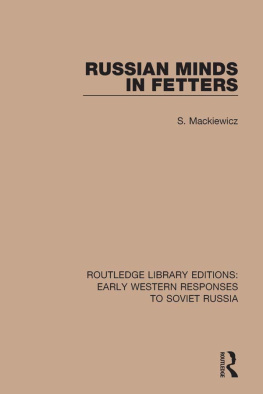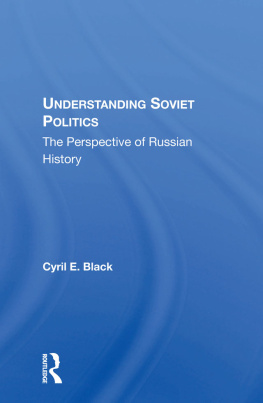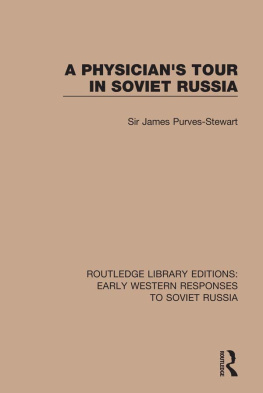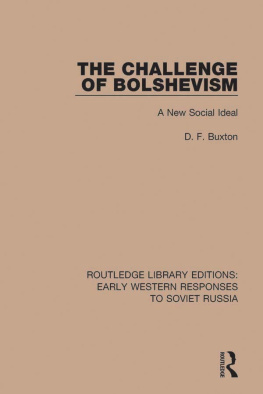Table of Contents
Guide
Print Page Numbers
ROUTLEDGE LIBRARY EDITIONS: EARLY WESTERN RESPONSES TO SOVIET RUSSIA
Volume 11
RUSSIAN MINDS IN FETTERS
RUSSIAN MINDS IN FETTERS
S. MACKIEWICZ
First published in 1932 by George Allen & Unwin Ltd
This edition first published in 2018
by Routledge
2 Park Square, Milton Park, Abingdon, Oxon OX14 4RN
and by Routledge
711 Third Avenue, New York, NY 10017
Routledge is an imprint of the Taylor & Francis Group, an informa business
1932 S. Mackiewicz
All rights reserved. No part of this book may be reprinted or reproduced or utilised in any form or by any electronic, mechanical, or other means, now known or hereafter invented, including photocopying and recording, or in any information storage or retrieval system, without permission in writing from the publishers.
Trademark notice: Product or corporate names may be trademarks or registered trademarks, and are used only for identification and explanation without intent to infringe.
British Library Cataloguing in Publication Data
A catalogue record for this book is available from the British Library
ISBN: 978-1-138-04993-2 (Set)
ISBN: 978-1-315-11072-1 (Set) (ebk)
ISBN: 978-1-138-07119-3 (Volume 11) (hbk)
ISBN: 978-1-315-11469-9 (Volume 11) (ebk)
Publishers Note
The publisher has gone to great lengths to ensure the quality of this reprint but points out that some imperfections in the original copies may be apparent.
Disclaimer
The publisher has made every effort to trace copyright holders and would welcome correspondence from those they have been unable to trace.
RUSSIAN MINDS IN FETTERS
by
S. MACKIEWICZ
With an Introduction by
PRINCE EUSTACE SAPIEHA
LONDON
GEORGE ALLEN & UNWIN LTD
MUSEUM STREET
FIRST PUBLISHED IN 1932
CONTENTS
IT often happens that a mysterious disease cannot be defined even by clever doctors, and only a specialist in neurology can give a satisfactory diagnosis. In my opinion Mr. Mackiewicz has filled the part of just such a specialist, examining the case of Bolshevism. This verdict is hysteria, and that alone would be nothing new, as many before him have described the complaint of Russia in very much the same words; but the analysis he gives us of that special form of hysteria is a masterpiece.
Soviet Russia has been described and discussed from the economic and sociological points of view; this is a study of the psychological side of the problem. It answers a hundred unanswered questions; it makes the whole problem clear.
Studying Bolshevism, we must not forget that our mind also is in fetters. Ours are the golden bonds of Christian morality, grafted on the heirloom of ancient Greece and Rome, bearing traces of a hundred civilizations which have crystallized into our present ethical standards. These standards are apt to blur our judgment on Bolshevism, because, dealing with Russia, we must use another code or run the risk of being partial. Bolsheviks are neither good nor bad, neither cruel nor kind, neither just nor unjust. Love, kindness, morality, pity and justice are equally banished from Bolshevia as well as the Christian inverse of those virtues. All those terms and conceptions are considered bourgeois prejudice, and the Russian communists exert themselves successfully to train a people of a hundred and fifty millions into using a new code devoid of all Christian morality.
It is not only unfair to exaggerate the atrocities of the Soviets, it is also very unwise, and deceptive immorality at the worst is only a momentary rebellion against a ruling morality; the total absence of morality even without excesses, as is the case at this moment in Russia, is the dethroning of moral law, which is a great deal worse. That is why the objectivity of Mr. Mackiewicz is of so great a value. It shows clearly that we have to deal not with a violent, passing crisis, but with a chronic, spreading and lasting organic transformation.
Russian Minds in Fetters is impartial and as fair as fair can be. Indeed, Mr. Mackiewicz has even been accused of pro-Bolshevism. Still no book on Soviet Russia impresses us more, nor has any made me more keenly conscious of the danger menacing the civilized world.
It is not that the author is blind to the possibilities of failure of Bolshevik plans and undertakings; he shows us impartially the pro and the contra of the whole question, but he does not make the fatal mistake of applying sane criteria to a mad community.
I have over and over again met two mistakes, repeated even by prominent statesmen: one is the tendency to draw a parallel between the Bolshevik nightmare and the great French revolution, the other is the belief that a prosperous Russia under Soviet rule will be much tamer than a starving Bolshevia. After reading Russian Minds in Fetters, you plainly see the error of such opinions. I remember in the year 1920 one of the most prominent English statesmen in those days warning Poland not to risk rousing the Bolsheviks, lest a Russian Napoleon should arise in the East and bring confusion to all Europe. If this honourable gentleman, who seemed to fear having to play the part of a modern Pitt, had known something about Soviet Russia, he would rather have spoken of Attila or Gengis-Khan coupled with the efforts of Peter the Great and the fanaticism of the first Mahomedans. This would have been more to the point and quite a different proposition. I really believe that reading this little book might in future save many a mistake and many misconceptions.
I hope Russian Minds in Fetters will be read by students of history, philosophy and sociology, and also specially by statesmen. They will all find it useful.
PRINCE EUSTACE SAPIEHA
Former Polish Minister of Foreign Affairs and former Minister of Poland at the Court of St. James















